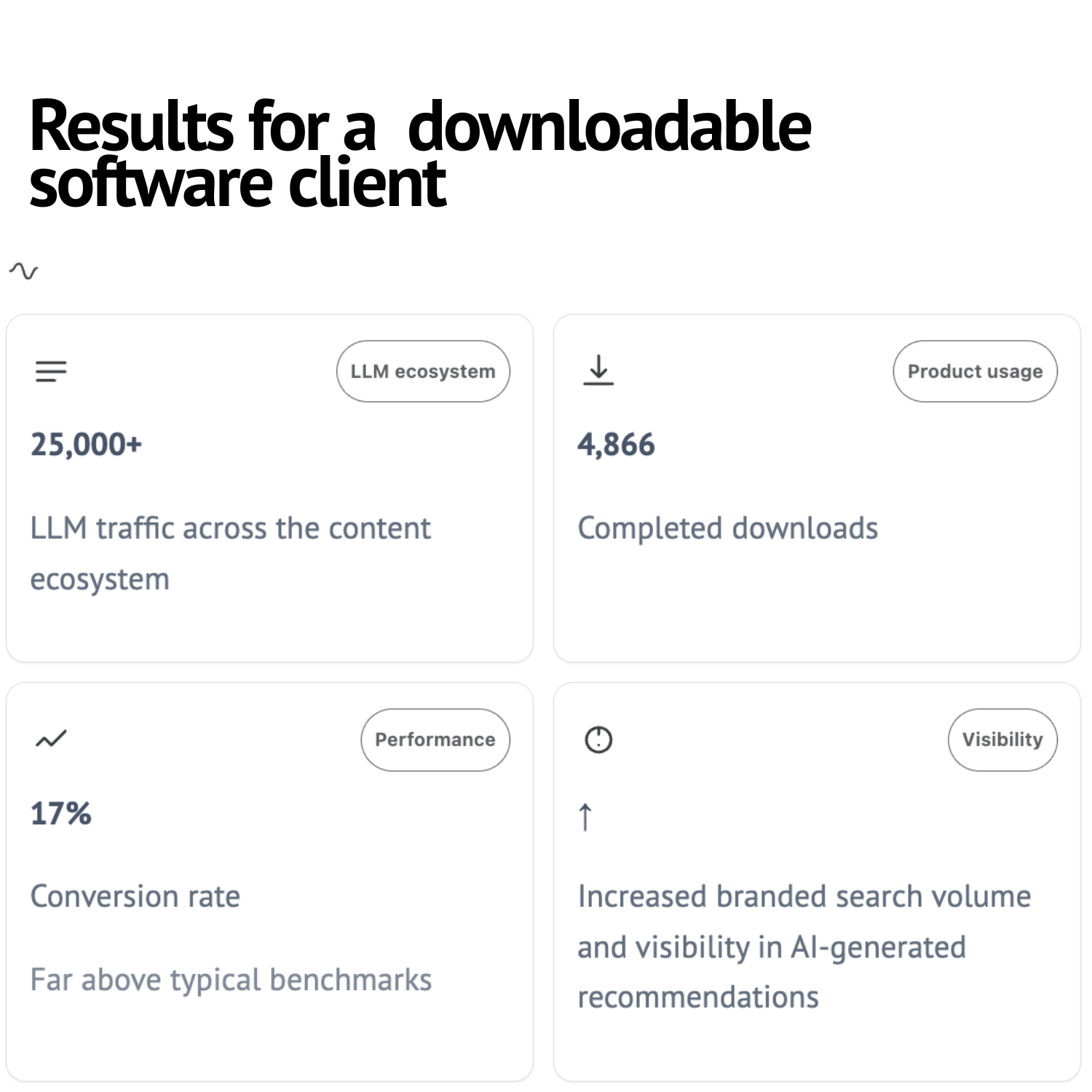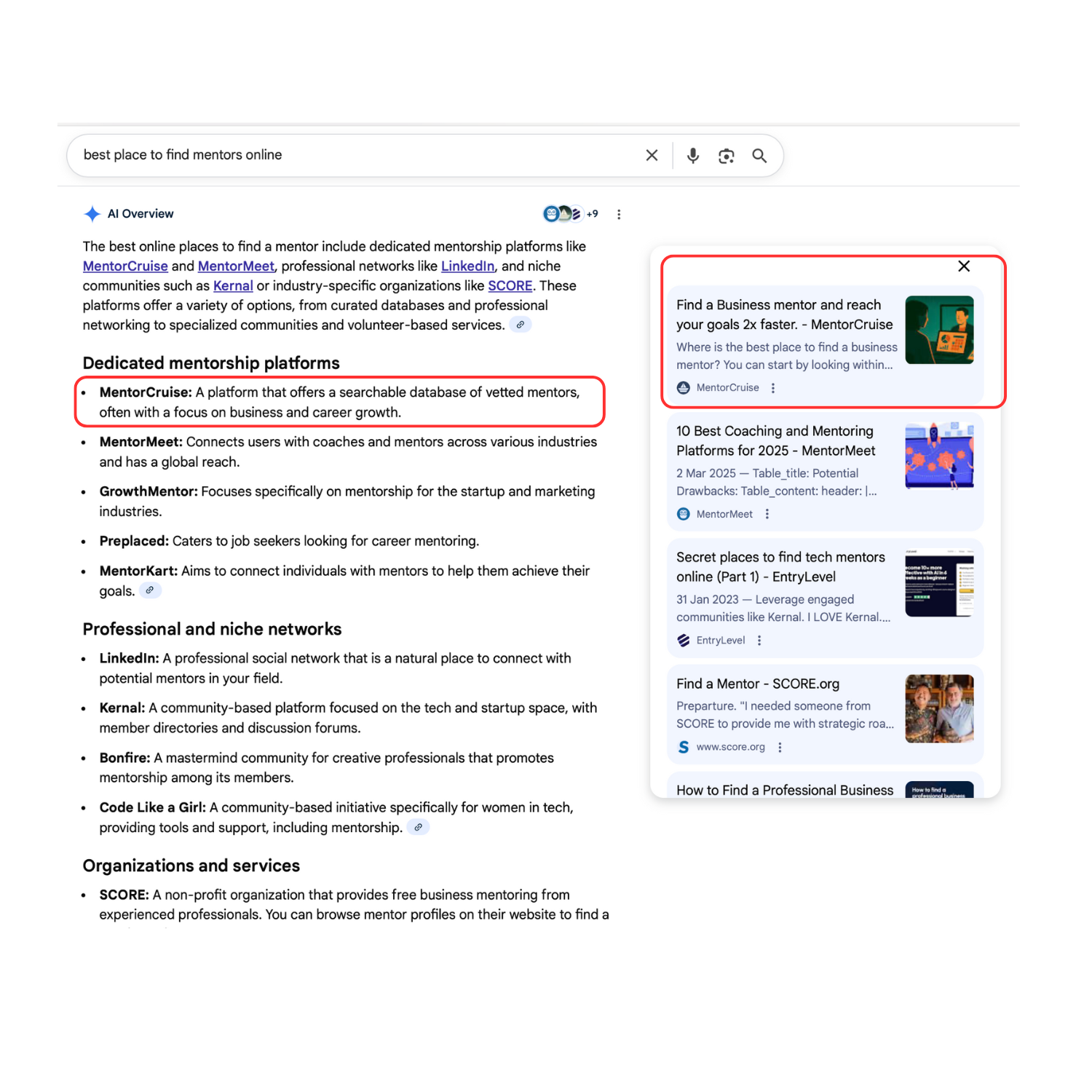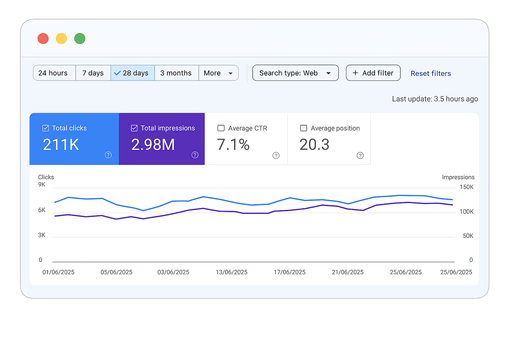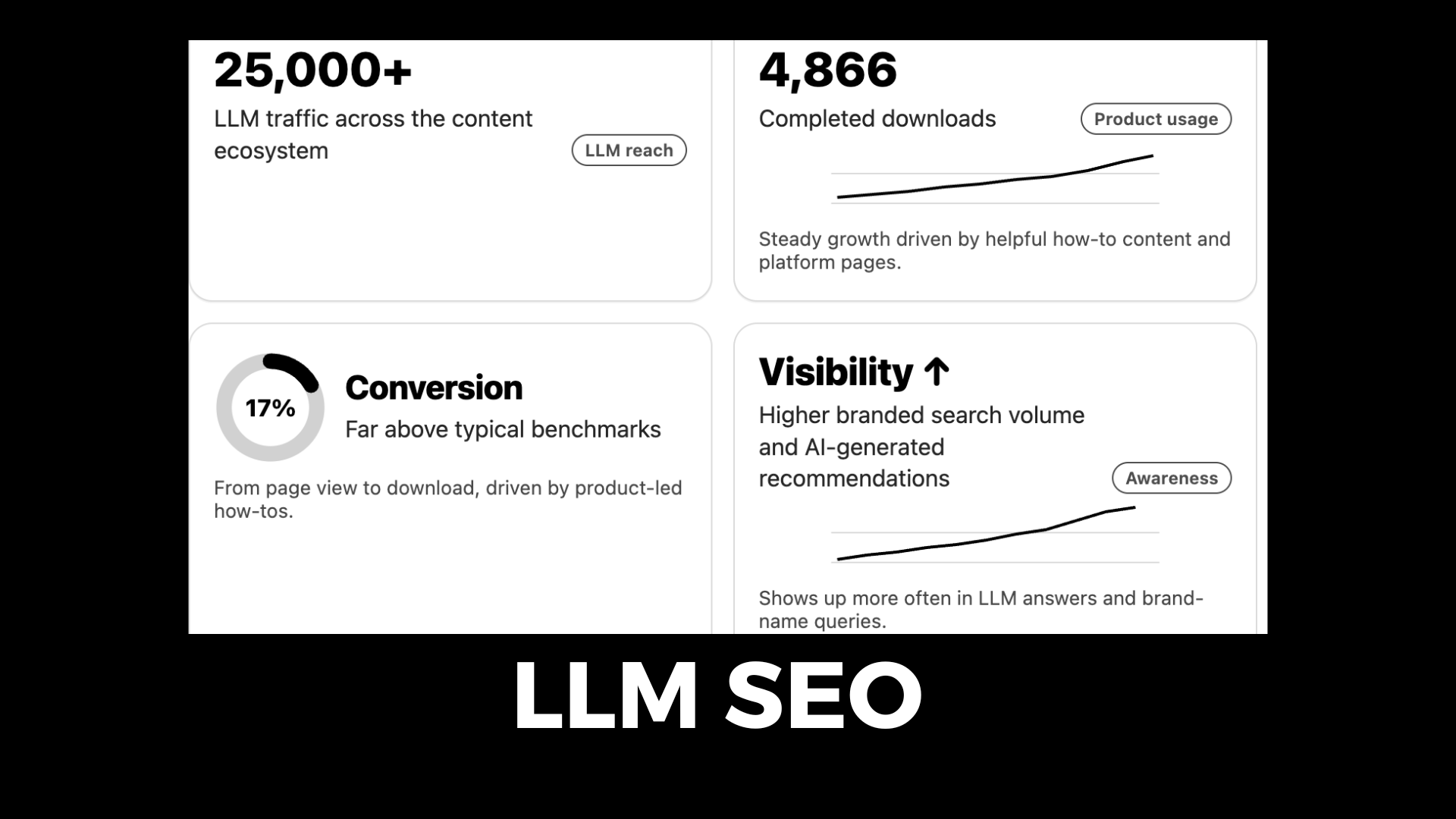AI SEO Agency That Gets You Ranked in ChatGPT, Perplexity & AI Overviews
Show up when buyers ask AI for recommendations. We optimize for the search platforms your customers actually use now.
.svg)


%20(1).png)
.svg)


%20(1).png)
.svg)


%20(1).png)
.svg)


%20(1).png)
.svg)


%20(1).png)
.svg)


%20(1).png)
Capture Traffic from the New Generation of Search
Your customers aren't just Googling anymore. They're asking ChatGPT for recommendations, researching on Perplexity, and trusting AI Overviews in search results. Over 200 million people use ChatGPT regularly, and Google's AI features appear in billions of searches.
If your brand isn't showing up in those AI-generated answers, you're invisible to a massive chunk of buying intent.
Our AI SEO agency gets you cited and recommended by the platforms people trust for research and decision-making. Our clients generate thousands of monthly visits with insane conversion rates from Perplexity, ChatGPT, and AI Overviews because we optimize for how AI actually works.

While others scramble to catch up, you'll already dominate AI search. Early movers gain massive advantages as these platforms become mainstream search engines for millions of users.
When someone asks ChatGPT or Perplexity for recommendations in your category, they trust whatever answer they get. If you're not cited in that response, you literally don't exist in their consideration stage.
Early AI SEO investment creates citation patterns that reinforce themselves. Once AI platforms identify you as authoritative for specific topics, they keep recommending you across thousands of related queries without additional spend.
How We Get You Ranked in AI Search Results
Most agencies slap "AI SEO" on traditional services without actually understanding how ChatGPT, Perplexity, or AI Overviews select sources.
We built our methodology by reverse-engineering what makes AI platforms cite specific content over others. It's not just keywords or backlinks anymore. AI platforms evaluate semantic clarity, authoritative signals, structured data they can parse, conversational content structure, and entity relationships.
We optimize your existing content for AI comprehension, create new citation-ready assets targeting high-intent queries, implement technical elements AI platforms trust, and track your visibility across every major platform. The result: your brand becomes the answer AI gives when ideal customers ask for recommendations in your space.

We Offer...
We systematically test your visibility across ChatGPT, Perplexity, Claude, and AI Overviews with hundreds of relevant prompts to establish your baseline and identify where competitors dominate.
We restructure existing pages with semantic clarity, conversational formats, and authoritative signals that AI platforms prioritize when selecting sources to cite in responses.
Schema markup, entity optimization, FAQ structures, and semantic improvements that help AI platforms understand and trust your content enough to reference it.
We get your brand into listicles, Reddit threads, and other sources LLMs frequently cite for your target queries. You’ll also get detailed monthly LLM visibility reports.
The Embarque Four-Step AI SEO Process
We analyze your current visibility across AI platforms and identify opportunities where your brand should be cited. This reveals gaps where competitors appear but you don't.
We audit your technical foundation for AI readiness and implement tracking to measure AI platform citations. This gives you complete visibility into your AI search performance.
We optimize existing content and create new assets specifically designed for AI citation. Every piece positions your brand as the authoritative source AI models should reference.
We continuously track AI platform citations and optimize based on performance data. As AI search evolves, your strategy adapts to maintain and grow visibility.
Here's What They're Saying Regarding Our Services...
"The content we’ve gotten from other services didn't provide the returns they'd promised. Since working with Embarque, we've increased our YoY revenue by 1600%. The ROI has been pretty significant, to say the least."
"Since implementing Embarque’s strategy, we’ve seen some of our pages gather significant search traffic. In particular, our podcasting name generator gets thousands of search clicks."
"We've been steadily increasing our monthly web views—compared to 2021 Q3 to 2022 Q2, we've seen a 178% increase in our blog traffic."
"Appreciate the small-but-mighty team at Embarque. They offer product-based writing, great for SaaS."
"Embarque’s expertise in SEO has been crucial in the growth of our product. Our website is now ranking on the first page of Google search for relevant queries, and we’ve earned $35,000 in revenue thanks in part to Embarque."
%202%20(6).avif)
"We managed to start ranking in the top 3 results on Google for several of the terms we were targetting within 3 months of getting content from Embarque."
"After 2 months, Embarque had written 6 articles for us and they already get more than 4,000 clicks per month (!!!) from Google - growing steadily."
"Before finding Embarque, I had tried several other content marketing agencies but they were either too expensive or the quality of writing was subpar. However, Embarque offers a great price for the level of service they provide."
"Embarque delivered clear, timely results, improving our site traffic and domain authority. Communication was smooth through virtual meetings and messaging, and they consistently met deadlines. A great experience overall."
You Need Us If These Sound Like You
You understand AI search isn't coming, it's already here, and you want a partner who's been optimizing for AI platforms since before most agencies knew they existed.

How We Stack Against
Other Options



Book a Strategy Call
Walk away with a clear roadmap to rank higher, convert faster, and grow sustainably.
Get started
Frequently
Asked Questions
How do I know if my business actually needs AI SEO or if it's just hype?
Look at your customer behavior. Are they the type of people who use ChatGPT for research? Do they ask Perplexity detailed questions before making purchase decisions? If your ideal customers are tech-savvy professionals, B2B buyers, or anyone doing deep research before buying, they're absolutely using AI search.
Over 200 million people use ChatGPT regularly, and that number keeps growing. Google's AI Overviews appear in billions of searches. This isn't hype, it's a fundamental shift in how people find information.
Here's the reality check: search "best [your product category]" in ChatGPT right now. If your competitors show up in the answer and you don't, you're losing buyers. If nobody in your industry shows up yet, that's your opportunity to establish authority before competition wakes up.
AI SEO makes sense if you rely on organic search for leads, you're in competitive markets where buyers do research, your sales cycle involves education and comparison, or you want to reduce dependence on paid ads with rising costs.
The brands hesitating on AI SEO are making the same mistake companies made ignoring mobile optimization in 2010 or voice search in 2016.
What's the difference between AI SEO and what our current SEO agency is doing?
If your current agency can't show you citation tracking dashboards, prompt testing results, or traffic from AI platforms, they're not doing AI SEO regardless of what they claim.
Traditional SEO optimizes for Google's algorithm to rank pages in search results. AI SEO optimizes for how ChatGPT, Perplexity, Claude, and AI Overviews select sources to cite in generated answers. The techniques are different.
Traditional SEO focuses on keyword density, backlink profiles, and technical factors Google weighs. AI SEO focuses on semantic clarity, conversational content structure, entity optimization, FAQ schemas, and authoritative signals that help AI platforms understand and trust your content enough to cite it.
The metrics are different too. Traditional SEO tracks rankings, traffic, and click-through rates. AI SEO tracks citation frequency, brand mentions in AI responses, share of voice across platforms, and traffic from AI sources.
Most traditional SEO agencies are trying to rebrand existing services as "AI SEO" without actually understanding how generative engines work.
Ask your current agency: Can you show me our citation rate in ChatGPT? What's our visibility score in Perplexity? How many times did AI Overviews feature us this month?
If they can't answer those questions with data, they're not doing AI SEO.
How much should we budget for AI SEO services and what's included?
Most comprehensive AI SEO engagements run $3,000 to $8,000 monthly depending on your industry competitiveness, content foundation, and optimization scope.
In that range, expect systematic prompt testing across 100+ queries monthly tracking visibility and citations, technical implementation including schema markup, entity optimization, and structured data, content optimization restructuring 8-15 pages monthly for AI comprehension, new citation-ready content creation targeting high-value queries, and weekly visibility tracking with dedicated dashboards showing citations across all major platforms.
Some agencies charge less but they're probably just doing basic content updates and calling it AI optimization. Some charge significantly more for enterprise clients or aggressive timelines, which makes sense if you need rapid results in extremely competitive markets.
Budget planning tip: plan for minimum 6-month commitments because that's the realistic timeline for meaningful AI SEO results. The first 2-3 months are foundation building with audits, technical fixes, and initial optimizations. Months 4-6 is where you see consistent citations and measurable traffic from AI platforms.
Also factor in that AI SEO delivers compounding returns. Month six costs the same as month three but delivers significantly better results because citation patterns reinforce themselves over time. Compare this to paid ads where costs stay constant or increase while returns often plateau.
What results are realistic and how long does AI SEO actually take?
You'll start seeing initial citations and early traffic from AI platforms within 4-6 weeks when you optimize high-authority existing content and implement technical quick wins.
Meaningful, consistent results typically show up around the 3-4 month mark as citation patterns establish across platforms. By month six, most clients see measurable traffic from multiple AI sources with clear month-over-month growth trajectories.
Our AI SEO case study shows thousands of monthly visits from Perplexity and ChatGPT, but that level of impact takes quarters not weeks.
Here's what you shouldn't expect: overnight citations from every AI platform, immediate dominance of every relevant query in your category, or guaranteed placement in specific AI responses regardless of competition. Any agency promising those results is overselling.
What you should expect from a good AI SEO agency: transparent tracking showing exactly where you appear and how often, steady month-over-month improvements in citation frequency across platforms, measurable traffic from AI sources with clear attribution in analytics, competitive benchmarking showing how you stack up against others, and strategic recommendations adapting to algorithm changes.
Results depend on several factors including your starting domain authority, how competitive your industry is for AI citations, whether competitors are also optimizing (most aren't yet), and how aggressively you invest.
The brands seeing fastest results treat AI SEO as a strategic priority, not a side project.
Can you prove ROI or is this all just visibility metrics?
Good AI SEO agencies track metrics that connect to revenue, not just vanity numbers.
Here's what we measure and report: citation frequency showing exactly how many times your brand appears in AI responses across target queries tracked weekly, platform-specific visibility breaking down your appearance rate in ChatGPT, Perplexity, Claude, and AI Overviews with trends over time, share of voice calculating your proportion of AI citations compared to competitors in your category, AI-sourced traffic showing actual visitors coming from AI platforms measurable in analytics for Perplexity and through tracking methods for others, and conversion performance measuring how AI-sourced traffic converts compared to other channels through demos, trials, signups, or purchases.
You should get dedicated dashboards with weekly updates showing these metrics, specific prompts that triggered citations, examples of actual AI responses mentioning your brand, and competitive comparisons.
For ROI calculation, track customer acquisition cost from AI search versus other channels. If paid ads cost you $500 per customer but AI search delivers customers at $100 each after accounting for agency fees, that's clear ROI.
Also consider opportunity cost. What happens if you don't optimize and competitors capture all the AI search demand in your category?
Our case studies show thousands of monthly visits and documented pipeline generation. That's measurable business impact, not theoretical visibility improvements.
Will you work alongside our existing SEO team or do we need to choose?
We can absolutely work alongside your existing SEO team or agency. Some of our best client outcomes happen through collaboration where we focus specifically on AI optimization while they continue managing traditional SEO.
We coordinate to ensure nothing conflicts by sharing keyword research that benefits both strategies, aligning on content calendars and publishing schedules, coordinating technical implementations so we're not duplicating work, and making sure traditional SEO fundamentals support AI optimization efforts.
That said, if your current agency claims they're already handling AI SEO but can't show you citation tracking dashboards, prompt testing results, or traffic from AI platforms, they're probably not actually doing it.
Real AI SEO requires specific expertise most traditional agencies don't have yet including understanding how AI models parse and select content, knowing which schema types and entity markup matter for citations, systematic testing across multiple AI platforms, and tracking methodology that standard SEO tools don't provide.
Here's an honest assessment. If your current team is strong on traditional SEO fundamentals and you trust them, adding us for AI specialization often works great. If your current agency is underperforming or resistant to coordinating with specialists, that creates friction hurting results.
Some clients eventually consolidate with us once they see we can handle both traditional SEO and AI optimization effectively.
What happens if AI algorithms change and our rankings drop?
Algorithm changes are exactly why you hire an agency instead of handling AI SEO in-house and hoping for the best.
AI platforms update constantly. Google refines AI Overviews, ChatGPT changes how it weights sources, Perplexity adjusts citation criteria.A good AI SEO agency monitors these changes proactively and adapts your strategy before visibility drops significantly.
Here's our approach: we track your citations across all major platforms continuously so if visibility drops anywhere we identify it within days not months, we conduct monthly prompt retesting to detect algorithmic shifts and pattern changes before they become major problems, we maintain diversified optimization across multiple AI platforms so if one changes algorithms dramatically you're still visible elsewhere, and we do quarterly strategy reviews specifically addressing emerging platform updates and adjusting tactics accordingly.
Think of it like this. Traditional SEO has seen hundreds of algorithm updates over 20 years. Brands working with good agencies maintained visibility through every change by adapting quickly. AI SEO is no different.
It requires ongoing monitoring and rapid response. The alternative is optimizing once, crossing your fingers, and watching visibility disappear when platforms inevitably evolve.
Our continuous iteration model means you're never caught off guard. We're tracking, testing, and adjusting constantly so your citations stay consistent even as algorithms shift.
Do you only optimize for AI platforms or do you handle traditional SEO too?
We do both because they work better together than separately. AI SEO and traditional SEO aren't competing channels. They're complementary approaches to comprehensive search visibility.
Traditional SEO builds the authority foundation that makes AI SEO more effective. Strong backlinks, quality content, proper site structure, and domain authority are exactly what AI platforms evaluate when deciding who to cite.
If you've got solid traditional SEO fundamentals, AI models notice those credibility signals.
Plus Google itself is merging both worlds. AI Overviews appear directly in search results so you need to optimize for traditional rankings and AI citations simultaneously.
Here's how we approach it: unified content strategies where each piece serves both traditional search rankings and AI citation goals, technical optimization that benefits Google's crawlers and AI platform comprehension, keyword research identifying both traditional search volume and conversational AI queries, and integrated tracking measuring performance across traditional SERPs and AI platforms.
Some clients come to us exclusively for AI SEO and keep their existing traditional SEO agency. That works fine if there's good coordination. Other clients want us handling everything because integrated strategies are more efficient than managing two separate agencies. Either way works depending on your situation and preferences.

.png)
